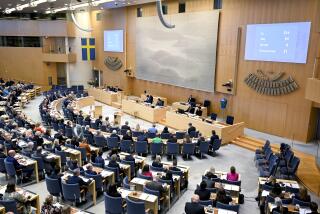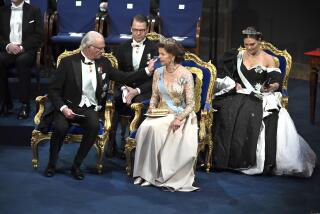What’s in a Name? To Thousands of Swedes, It’s a Matter of Having Own Identity
- Share via
STOCKHOLM — When Sven Johansson became tired of sharing his last name with 378,000 Swedes, he asked to change it.
So have thousands of other Johanssons, Peterssons and Svenssons--names so common that mix-ups are inevitable. The Stockholm telephone book has 48 pages of Anderssons. To avoid confusion, you can have your occupation listed next to your name.
Each year, about 4,000 people in this nation of 8.4 million apply to the Patent and Registration Board to change at least one of their names.
Over the last few decades, the number of Johanssons has fallen from 5% to 3.7% of the population, according to government statistics.
Sensitive Issue
Most Swedes with a new name are reluctant to admit they changed it, and the issue is so sensitive that the Patent Board now refuses to identify them.
The typical applicant is upwardly mobile and seeking greater distinction in life. But a variety of reasons are offered on the forms, said Marie Zethelius, the board’s secretary.
Many applications come from criminals and are written along the lines of “now I am in jail, but when I get out I want to start a new life,” she said.
Not everyone meant it as literally as Stig Bergling, a convicted Soviet spy serving a life sentence. Bergling adopted his middle name, Eugen, and took his mother’s maiden name, Sandberg, a process that did not need the Patent Board’s approval.
Escaped From Prison
On Oct. 5, Bergling escaped while on a conjugal leave from prison and vanished with his wife. Border guards searched for a “Bergling” until the name change was discovered.
The 18 most common names in Sweden end in “son,” a result of the way most names were formed when this was largely a rural country. People simply took their father’s first name as the basis for their surname.
Thus, Johan Svensson was the son of Sven. His sons in turn called themselves Johansson, and his daughters were Johansdotter.
It was only in 1963 that names were regulated and the old practice stopped.
Exclusive Use of Names
Not everyone gets the name they want, said Torsten Hallen, director of the Patent and Registry Board. The board deals with name applications in the same way it does with inventions, checking that no one else has it first.
Once a name is approved and registered, the applicant and relatives are the only ones who can use it, Hallen said in an interview.
One of the board’s toughest cases was that of Sven (Tumba) Johansson, the center forward of Sweden’s 1966 world champion ice hockey team.
Johansson wanted to make his nickname, Tumba, his surname. The board refused because Tumba also is the name of a Stockholm suburb, which could confuse the postal service. The board eventually backed down.
No Ridicule, Offense
The board refuses to grant requests it deems “can cause ridicule or offense.”
Among its file of rejects is a would-be Snow White and a man who thought of himself as “fabulous.” Another asked to become Strula , which literally means “to make trouble.” Cuse , which when spelled differently means “nag,” also was turned down.
Many cases involve people who change their names for their protection, Zethelius said. As often as once a week, the board receives applications from battered wives fleeing their husbands, from people who have testified in court and fear retribution and other victims of crimes, she said.
Some applicants simply hate their parents and do not want their name, she said.
Computer Names
Applicants with no inspiration can turn to a computerized list of 40,000 suggested names compiled by Sture Alle’n, secretary of the Swedish Academy, which awards the Nobel Prize in literature.
Alle’n relied heavily on elements of nature that traditionally make up Swedish surnames, combining commonly used prefixes like blom, which means “flower,” with suffixes like vallen meaning “meadow.” Hence, Mr. Blomvallen (Bloomfield).
More to Read
Sign up for Essential California
The most important California stories and recommendations in your inbox every morning.
You may occasionally receive promotional content from the Los Angeles Times.













